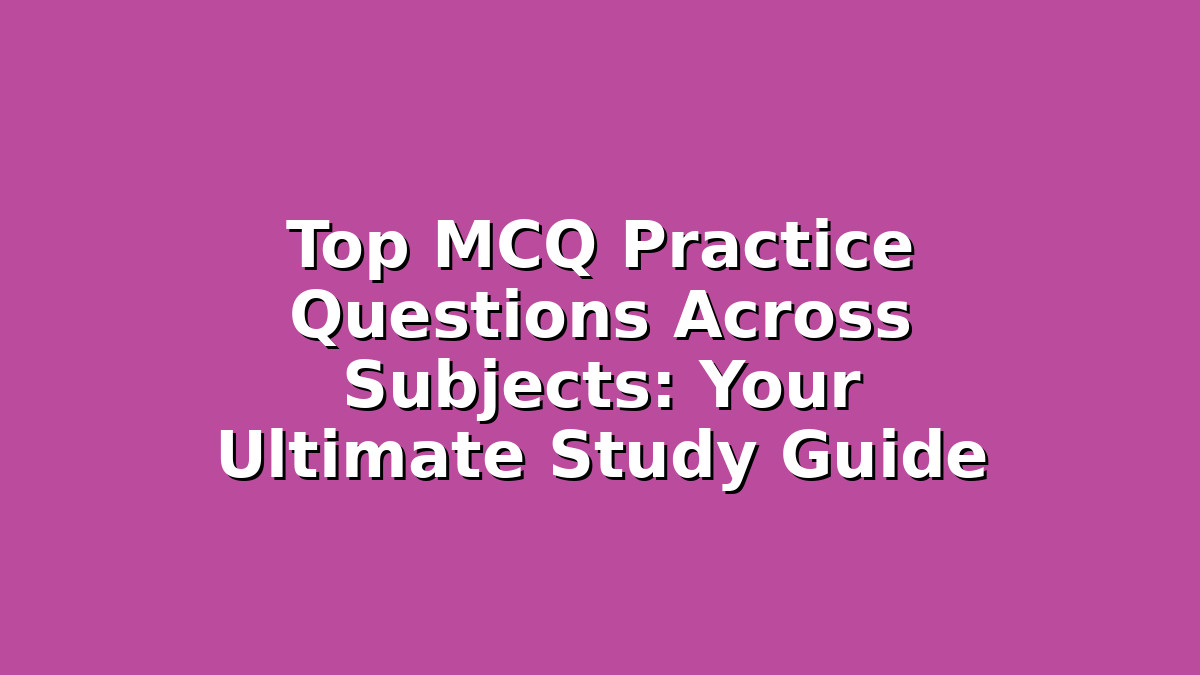Preparing for exams can be a daunting task, especially when juggling multiple subjects and study materials. One of the most effective ways to boost your preparation and confidence is through practicing Multiple Choice Questions (MCQs). MCQs are widely used in various examinations because they test your knowledge, speed, and decision-making skills. Whether you are preparing for school exams, competitive tests, or professional certifications, mastering MCQs across subjects can significantly improve your performance.
In this comprehensive guide, we’ll explore the benefits of MCQ practice, highlight top MCQ questions from major subjects, and share practical study tips to help you maximize your learning. Let’s dive in!
Why MCQ Practice is Crucial for Students
MCQs are more than just a way to test your memory—they challenge your understanding of concepts and help develop critical thinking. Here’s why practicing MCQs is essential:
– Improves Time Management: MCQs require quick thinking and decision-making, helping you manage your time better during exams.
– Identifies Knowledge Gaps: By practicing questions, you can pinpoint topics where you need more revision.
– Enhances Retention: Active recall through question practice boosts memory retention more effectively than passive reading.
– Builds Exam Confidence: Familiarity with MCQ patterns reduces anxiety and boosts confidence on exam day.
Now, let’s explore the top MCQ practice questions across core subjects and how they can aid your study routine.
—
1. Top MCQ Practice Questions in Science (Physics, Chemistry, Biology)
Science subjects often involve a combination of theory, formulas, and application-based questions. Practicing MCQs can solidify your understanding of fundamental concepts and prepare you for tricky questions.
Physics:
Physics MCQs typically cover mechanics, thermodynamics, optics, and electromagnetism. For example:
– What is the unit of electric current?
– A) Volt
– B) Ampere
– C) Ohm
– D) Watt
– Which law states that the pressure of a gas is inversely proportional to its volume at constant temperature?
– A) Charles’s Law
– B) Boyle’s Law
– C) Newton’s Law
– D) Ohm’s Law
*Study Tip:* When practicing physics MCQs, write down formulas and units separately. Attempt problems requiring formula application and conceptual questions to build a balanced understanding.
Chemistry:
Chemistry MCQs span atomic structure, periodic table, chemical reactions, and organic chemistry. Sample question:
– Which element has the highest electronegativity?
– A) Oxygen
– B) Fluorine
– C) Chlorine
– D) Nitrogen
– What is the pH of a neutral solution at 25°C?
– A) 0
– B) 7
– C) 14
– D) 1
*Study Tip:* Practice balancing chemical equations and memorize periodic table trends. Understand reaction mechanisms through MCQs to apply knowledge rather than rote learning.
Biology:
Biology MCQs test your grasp of life processes, genetics, human anatomy, and ecology. Example:
– What is the powerhouse of the cell?
– A) Nucleus
– B) Ribosome
– C) Mitochondria
– D) Chloroplast
– DNA replication occurs during which phase of the cell cycle?
– A) G1 phase
– B) S phase
– C) G2 phase
– D) M phase
*Study Tip:* Use diagrams and flowcharts while studying biology to visualize concepts. Practice MCQs that integrate multiple concepts (e.g., cell biology + genetics) for deeper understanding.
—
2. Essential MCQ Practice Questions in Math and English
Mathematics and English are fundamental subjects where MCQs can greatly enhance accuracy and analytical skills.
Mathematics:
Math MCQs often cover algebra, geometry, calculus, and statistics. Common question types include problem-solving and concept application.
– What is the value of x if 2x + 3 = 11?
– A) 4
– B) 6
– C) 3
– D) 5
– The sum of interior angles of a triangle is:
– A) 180°
– B) 90°
– C) 360°
– D) 270°
*Study Tip:* Practice solving MCQs under timed conditions to improve speed. Also, revisit mistakes to understand where you went wrong—this is key to avoiding repeated errors.
English:
English MCQs test grammar, vocabulary, comprehension, and writing skills. Example questions:
– Choose the correct form: “She ______ to the store yesterday.”
– A) go
– B) went
– C) gone
– D) going
– Which word is a synonym of “happy”?
– A) Sad
– B) Angry
– C) Joyful
– D) Tired
*Study Tip:* Read widely to build vocabulary and comprehension skills. Use MCQs to practice grammar rules and punctuation, and review explanations for each answer to reinforce learning.
—
3. Study Strategies to Master MCQ Practice Across Subjects
Practicing MCQs effectively requires more than just attempting questions randomly. Here are some proven strategies to help you master MCQs:
a) Create a Study Schedule:
Allocate specific time slots for MCQ practice in each subject. Consistency is key to gradual and sustained improvement.
b) Use Quality Resources:
Choose MCQ question banks and practice tests from reliable sources such as textbooks, educational websites, and past exam papers.
c) Analyze Your Mistakes:
After each practice session, review incorrect answers carefully. Understand why you made mistakes and revise those topics for stronger grasp.
d) Simulate Exam Conditions:
Practice MCQs in timed, quiet environments to simulate real exam settings. This builds stamina and reduces exam-day anxiety.
e) Group Study Sessions:
Discussing MCQs with peers can reveal different approaches and clarify doubts you might have missed during solo study.
f) Mix Subjects to Boost Focus:
Avoid studying one subject for too long; alternating subjects keeps your mind fresh and engaged.
—
Conclusion
Mastering Multiple Choice Questions across subjects is a powerful way to prepare for exams. By practicing MCQs regularly, you sharpen your knowledge, improve time management, and build the confidence needed to excel. Remember to choose quality questions, analyze your mistakes, and study smartly with a balanced approach across subjects.
Stay motivated and consistent in your practice, and you’ll find that MCQs become your best ally in exam preparation. Good luck with your studies!

Responses